What is Tent Fumigation? See Top Frequently Asked Questions & Answers
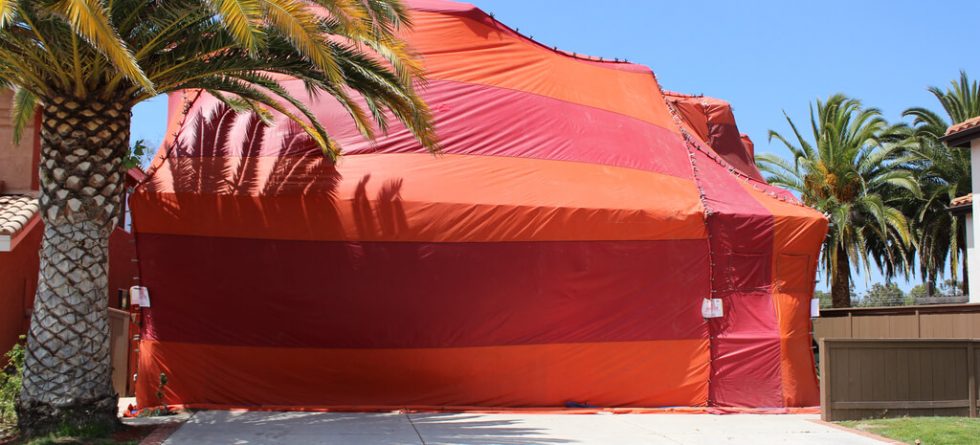
Tent fumigation is also called tenting and it often comes as a resort of a series of pest infestations. Tenting is usually not something that you can avoid and if a pest-control expert decides that this is the best course of action it’s important that you understand more about how the fumigation process will work.
Tenting a house can occur as a result of a series of infestation such as cockroaches, termites or bedbugs. You will have to prepare your home accordingly to be fumigated and this will mean vacating the house for a few days as well as moving your house plants and making arrangements for pets. Making sure that any gas flames and pilot lights are out as well as making sure that all of your appliances are off can be another important step to preparing for fumigation.
As well as the prep work, there are many different types of fumigation that might take place based on the pests you may have in your home. The amount of time it will take for your home to be tented and fumigated will depend on the size of your home as well as the extent of the infestation.
10 fumigation is something that needs to be handled by a professional. You may be tempted to use something like a bug bomb or tensing your house with at-home products but a fumigator needs to be a professional to get the job done right. If your home is infested it’s important to use a professional and make sure that the job is done completely.
Over the course of fumigation, your entire home will be sealed up with tarps while a warning agent is released throughout your home. The fumigator will determine the total amount of time that it will take for the chemicals to act and they will confirm when you can come back into your home too.
If you have a pest infestation and you’d like to know if you would be a good candidate for fumigation services, contact us today for more information.
More tent fumigation Q&A can be found here.
Does tenting kill all bugs?
Yes, tenting will kill virtually all bugs, however, we mainly fumigate for dry wood termites, bed bugs, cockroaches and powder post beetles
How long after fumigation is it safe?
The home is safe for re-entry when we test the air and make sure that the fumigant (gas) has dissipated. We have special equipment which tests exclusively for the fumigant.
Why do I have roaches in my clean house?
Roaches, like humans, are mainly after water. Just like us, they need water more frequently than food. In addition, roaches can survive on just a smudge of grease. Although a cluttered or dirty house can provide a better place for cockroaches to live, it is not the cause of roaches. Roaches are naturally occurring in our environment and will try to enter our homes just like ants and other home invaders.
How do I prepare my house for tenting?
One of our representatives will walk you through the entire preparation process, however, it mainly involves bagging up food and medicine into special bags and some ground preparation on the outside of the home. We do offer a service if the homeowner wants us to perform the preparation.
Is fumigation harmful to humans?
Fumigation is only harmful if a person was to stay in the structure while it was fumigated. We take a lot of precautions to make sure that nobody is in the building when we fumigate and we use special locking mechanisms to make sure nobody can enter a fumigated structure until we have cleared it for re-entry.
How often should fumigation be done?
Fumigation is not a preventative treatment, so it only needs to be done if you are battling pests, specifically, dry wood termite, bed bugs, cockroaches or powder post beetles.
Is it dangerous to live next to a tented house?
Not at all. Think of it as carbon monoxide, you would not be concerned walking down a sidewalk in a busy city or driving in a convertible, however, every single car is emitting carbon monoxide. If you took one single car and turned it on and locked yourself in a garage with no ventilation than the results would be fatal. The issue is not the carbon monoxide, per se, but the concentration because of the lack of ventilation. Once the gas reaches the open air it dissipates so rapidly that is not harmful.
Can fumigation make you sick?
SAME AS ABOVE-
Fumigation is only harmful if a person was to stay in the structure while it was fumigated. We take a lot of precautions to make sure that nobody is in the building when we fumigate and we use special locking mechanisms to make sure nobody can enter a fumigated structure until we have cleared it for re-entry.
What do I need to remove for fumigation?
Hopefully, it goes without saying that all living things (peoples, pets, plants) need to be removed before the fumigation. In addition, foods and medicines will need to be removed or placed in special bags prior to the fumigation.
How long does fumigation smell last?
There is no smell from fumigation. Fumigations are sometimes confused with “bombs” or “fogging”. Bombs, fogging and aerosol are water droplets and may have a smell, whereas fumigation is a pure gas and has no odor or color.
Does fumigation leave a smell?
No, The gas is completely colorless and odorless. In addition, there will be no gas in your home when you return, as we measure all the gas levels to make sure it is safe for re-entry. If you come back to your home and there is a bad smell, then it is probably a rat that may have been living in the attic who has been killed from the treatment.
What do you clean after termite tenting?
Nothing has to be cleaned after fumigation. The gas does not bond to any surfaces so there is no residual left.
How long after termite fumigation is it safe to return home?
It is only safe to return after we check and certify the structure has been properly aerated. We used special machines to detect the gas levels and ensure that you are only allowed home once it is safe.
What does fumigation smell like?
There is no smell. The fumigant is a pure colorless and odorless gas
What happens if you eat food exposed to Vikane gas?
How long do pesticides stay in your body?
We take many precautions not to allow for the absorption or ingesting of pesticides, however, to answer the question It would depend on the specific pesticide. There are many pesticides and each product is different. Each product, however, does contain a label and Material Data Safety Sheet which would provide some of that information.
Should you bag clothes for fumigation?
Nope, there is no need to bag clothes. The fumigant will not bond to the clothes
How long does fumigation take?
It is typically a 3-day process, however, exceptions can sometimes be made depending on aspects of the structure.
Will tenting a house kill bed bugs?
Yes
Does tenting kill German roaches?
Yes, tenting will kill all types of roaches, but the one we fumigate the most are german cockroaches as they are the most difficult to control with traditional sprays and baits.
How much does it cost to tent a house for cockroaches?
Tenting for cockroaches is the same as for dry wood termites. Fumigations become slightly costlier if treating for bed bugs or powder post beetles.
When should I fumigate my house?
It is important to always know your options when it comes to treatment and any good pest control company should provide you with this knowledge, however, when it comes to effectiveness, there is no treatment method that is as effective as structural fumigation. Gas, unlike other pesticide formulations, ie liquid, gel bait, aerson, will penetrate absolutely every area of the home, leaving no safe area for pests. Only gas can do this. If you are battling dry wood termites or bed bugs, I would very strongly suggest fumigation.
Is it safe to wear clothes after fumigation?
Absolutely, the fumigant will not bond to clothing or any other item for that matter.
Can I fumigate my house myself?
Nope. All fumigants are considered “Restricted Use Pesticides”, and can only be purchased by licensed individuals. In addition, not all pest control operators can fumigate, as even among, pest control operators, special licenses are required for the purchase, application, and transport of fumigants.
Are windows left open during fumigation?
At certain stages yes. The home needs to aerate properly and therefore we are required to open all windows at certain stages of the process to make sure that all the gas leaves home.
Does fumigation kill all termites?
This is a yes and no answer. Yes, it will kill all termites, however, we only typically perform fumigations for dry wood termites because they reside entirely within the wood of the home. Subterranean termites have their colonies below ground, so killing all the subterranean termites currently in the home, won’t solve the long term problem because more subterranean termites will come from the ground and re-enter the home. For subterranean termites will provide treatment around the home to provide a barrier of protection.
How much does it cost to tent a house for bed bugs?
It totally depends on the size of the home, however, fumigations for bed bugs are slightly more expensive then fumigations for dry wood termites as extra gas is used to penetrate the egg sac of the bed bugs.
Can I sleep in my bed after bed bug treatment?
Yes.
Is Orkin better than Terminix?
HA. That’s a good one. Our company performs fumigations for both companies. I used to work for Terminix many years ago and got my start with them, so I am probably biased. My experience is that they are both good companies, but as the owner of Security Termite and Pest Control, I would say we are the Champs!!!!
How long do bed bugs live after fumigation?
All the bed bugs, including eggs, will be dead. Fumigations are different than pesticide treatments. With pesticide treatments, it takes some time for the bed bugs to move around and get into the products, however, with fumigation (a gas) the fumigant will reach every area of the house.
More tent fumigation Q&A can be found here.
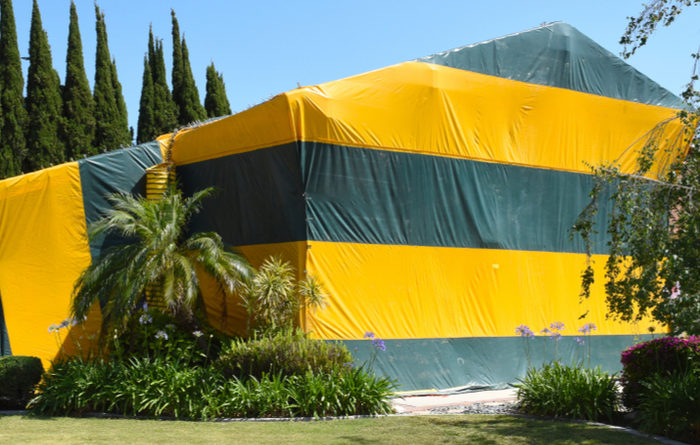
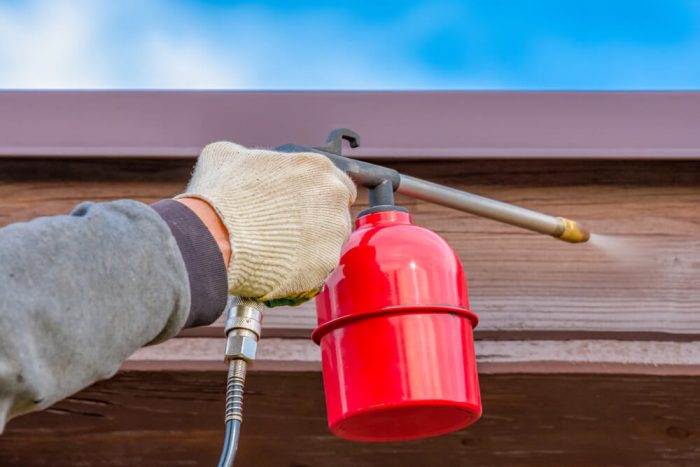
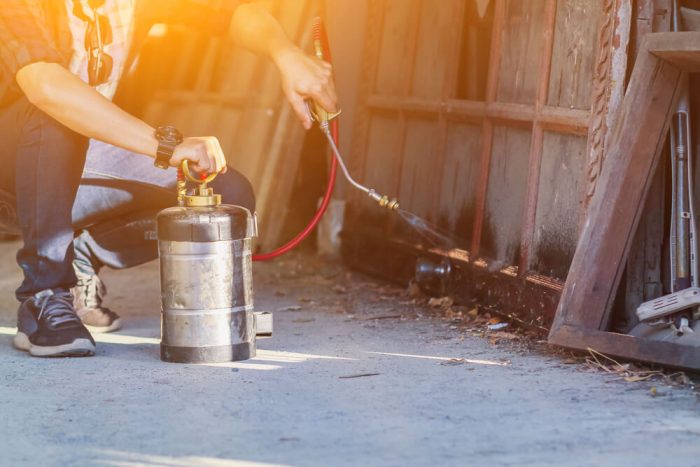
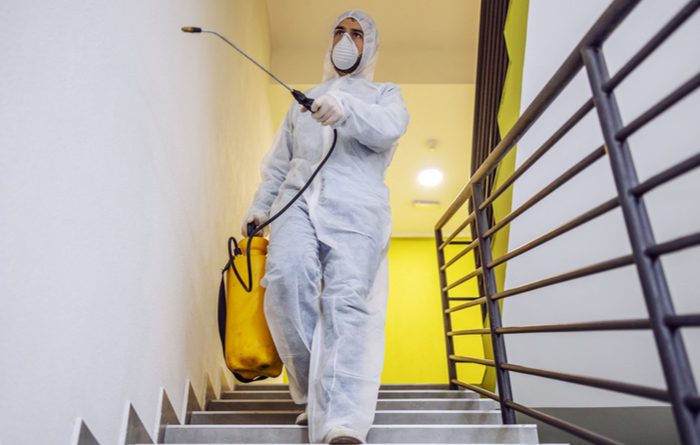
Leave a Comment